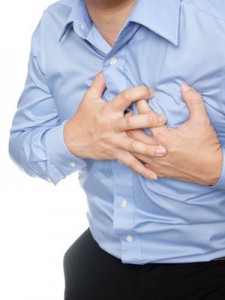
Chest pain, medically termed angina, occurs when there is a lack of oxygen in the blood flowing to the heart muscle. Angina may be experienced as a tense feeling in the chest, a sensation similar to heartburn, or aching or pain of the chest, shoulder, arm, neck and surrounding areas, and may be accompanied by nausea, increased sweating and cramping. Chest pain may manifest itself in different ways, however, all cases can be dangerous and should be taken very seriously.
Angina may occur as either stable, unstable or variant cases. Stable conditions are experienced when the heart muscle is exerting too much force and is typically triggered by rigorous exercise. Unstable chest pain is sporadic and unpredictable, requiring more attentive measures. Variant angina is produced by blood vessel spasms and may be experienced even while resting.
Conditions that may cause chest pain include:
Most cases of chest pain may be treated through reducing physical stress and exertion, eating smaller and healthier meals, and using medicines. Drugs that may treat angina include nitroglycerin, beta blockers, calcium channel blockers, angiotensin converting enzyme (ACE) inhibitors, blood thinners and other medications for relaxing vessels and preventing clots. Serious angina may need more drastic measures involving angioplasty, coronary artery bypass grafting, or the implementation of a stent to open arteries.
If the condition is left untreated, you may be more at risk for a heart attack, coronary artery disease or a heart-related death.